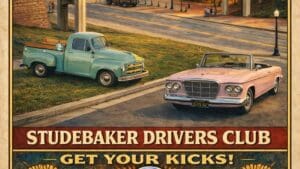Story by Jon Stalnaker AKA The Studebaker Dude
I’ve done a lot of training throughout my life, not just in the teaching part, but also in writing the material to be taught. I wrote a training program for new letter carriers in the Post Office when I was just a letter carrier myself. I did not write it using just the knowledge in my head, but I researched the official letter carriers handbook and manual that was created at the headquarters level of the United States Postal Service. That manual (the M41) was located at every letter carrier case in every carrier unit of the Postal Service, and probably still is. Carriers were able to refer to the information contained within, but I doubt if very many had studied it like I did to develop my training program. Word got to Headquarters and I ended up writing a supervisor’s training program for route inspection procedures that rolled out nationwide. The headquarters division that was responsible for postal delivery operations was impressed by my work as I would call them when I found errors in the publication. I was invited back to clean up some of those issues with a team of managers who were also considered subject matter experts. After I retired from the Postal Service, I wrote a docent training class covering Studebaker and Avanti automobiles for the California Auto Museum in Sacramento California. Those were just the big ones; I wrote a lot of other training material in my lifetime. I did a lot of research, and I trusted my resources.
I say all that to establish that I know a bit about researching information to teach history or “how to” do something. I never relied on my own knowledge completely, as I like to say “I know a lot about a lot, but don’t know everything about anything”. As I perused posts on Facebook, I saw a lot of responses written by someone who had no clue but responded as though they were subject scholars. When I look at such things, it scares me to think that information read on Facebook could be accepted as truth. It was bad enough before I started seeing all the AI images and information that have bombarded the Car Guy pages. I wrote a story about this subject back on May 8th this year and this has gotten exponentially worse since then. I don’t mind the AI images, but what scares me is the information that goes along with it identifying these made-up cars as if they were real. Being a docent at an automobile museum has educated me about cars and their history. But like I said earlier, I don’t know everything about anything, but these fake AI pictures are, for the most part, pretty easy for me to spot. On the other side of that coin is the fact that, although I learned a lot about early cars, I know that there are still cars out there that I have not seen. That’s one of the reasons I like belonging to so many car-related Facebook pages. The trouble is, sometimes these AI images are so good, I don’t know if it’s real or not. And I think about some of the rare cars that are out there and how people may think that they are just an AI fake. It’s kinda like my story about the Tucker and bullet nose Studebaker similarities (or lack thereof). Researching at a library is a great thing, but is all this fake Facebook crap going to filter into the library system at some point in the future? That’s a scary thought.


Again, the images created with AI are not the problem. I even enjoy looking at them and I can get a laugh out of how good or how bad they are. The problem is when they add narrative describing the car as something it is not. I saw one the other day that described the car as a 1931 Ford Model T. For those of us that know, the last Model T Ford was built in May of 1927. Don’t take my word for it, google it. I report these posts as giving out false information, but I continue to see these posts EVERY DAY. I started to do some research about AI this morning. I considered signing up online to create my own AI images. I chickened out when I saw they were indeed free, but you have to sign up to use it. Call me paranoid, I probably am, but I don’t trust the internet. Maybe that’s just because I’m an old man. (not that there’s anything wrong with that) Maybe one day I can be brave enough to actually try it and learn what it is all about, but for now, I’m happy being a grumpy old skeptic.


I understand why entertainers are wanting protection from the misuse of AI. I suspect that it can be used to make it look like somebody said or did something nefarious. I wonder how long it will take to get some safeguards in place to put a stop to all the nonsense that is flying around on the internet. I like being able to keep in touch with people using Facebook and I probably spend too much time on it. So, I hope it doesn’t get so bad that it becomes something we old people are afraid to use anymore. Or worse yet, it becomes something everybody is afraid to use. Use AI all you like, just identify it as artificial intelligence for crying out loud!







